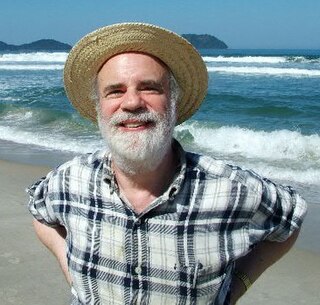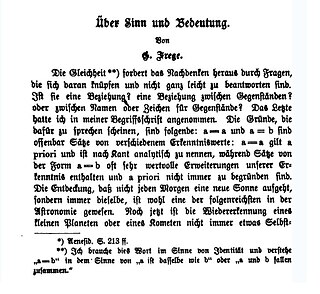Related Research Articles
Existence is the ability of an entity to interact with reality. In philosophy, it refers to the ontological property of being.

Ontology is the branch of philosophy that studies concepts such as existence, being, becoming, and reality. It includes the questions of how entities are grouped into basic categories and which of these entities exist on the most fundamental level. Ontology is sometimes referred to as the science of being and belongs to the major branch of philosophy known as metaphysics.
In the philosophy of language, a proper name – examples include a name of a specific person or place – is a name which ordinarily is taken to uniquely identify its referent in the world. As such it presents particular challenges for theories of meaning, and it has become a central problem in analytic philosophy. The common-sense view was originally formulated by John Stuart Mill in A System of Logic (1843), where he defines it as "a word that answers the purpose of showing what thing it is that we are talking about but not of telling anything about it". This view was criticized when philosophers applied principles of formal logic to linguistic propositions. Gottlob Frege pointed out that proper names may apply to imaginary and nonexistent entities, without becoming meaningless, and he showed that sometimes more than one proper name may identify the same entity without having the same sense, so that the phrase "Homer believed the morning star was the evening star" could be meaningful and not tautological in spite of the fact that the morning star and the evening star identifies the same referent. This example became known as Frege's puzzle and is a central issue in the theory of proper names.
In metaphysics, a universal is what particular things have in common, namely characteristics or qualities. In other words, universals are repeatable or recurrent entities that can be instantiated or exemplified by many particular things. For example, suppose there are two chairs in a room, each of which is green. These two chairs both share the quality of "chairness", as well as greenness or the quality of being green; in other words, they share a "universal". There are three major kinds of qualities or characteristics: types or kinds, properties, and relations. These are all different types of universals.

Saul Aaron Kripke is an American philosopher and logician in the analytic tradition. He is a Distinguished Professor of Philosophy at the Graduate Center of the City University of New York and emeritus professor at Princeton University. Since the 1960s, Kripke has been a central figure in a number of fields related to mathematical logic, modal logic, philosophy of language, philosophy of mathematics, metaphysics, epistemology, and recursion theory. Much of his work remains unpublished or exists only as tape recordings and privately circulated manuscripts.

In the philosophy of language, the distinction between sense and reference was an innovation of the German philosopher and mathematician Gottlob Frege in 1892, reflecting the two ways he believed a singular term may have meaning.

Essence is a polysemic term, used in philosophy and theology as a designation for the property or set of properties that make an entity or substance what it fundamentally is, and which it has by necessity, and without which it loses its identity. Essence is contrasted with accident: a property that the entity or substance has contingently, without which the substance can still retain its identity.
In modal logic and the philosophy of language, a term is said to be a rigid designator or absolute substantial term when it designates the same thing in all possible worlds in which that thing exists. A designator is persistently rigid if it also designates nothing in all other possible worlds. A designator is obstinately rigid if it designates the same thing in every possible world, period, whether or not that thing exists in that world. Rigid designators are contrasted with connotative terms, non-rigid or flaccid designators, which may designate different things in different possible worlds.
A causal theory of reference or historical chain theory of reference is a theory of how terms acquire specific referents based on evidence. Such theories have been used to describe many referring terms, particularly logical terms, proper names, and natural kind terms. In the case of names, for example, a causal theory of reference typically involves the following claims:
In analytic philosophy, actualism is the view that everything there is is actual. Another phrasing of the thesis is that the domain of unrestricted quantification ranges over all and only actual existents.

Nathan U. Salmon is an American philosopher in the analytic tradition, specializing in metaphysics, philosophy of language, and philosophy of logic.
A direct reference theory is a theory of language that claims that the meaning of a word or expression lies in what it points out in the world. The object denoted by a word is called its referent. Criticisms of this position are often associated with Ludwig Wittgenstein.
In the philosophy of language, the descriptivist theory of proper names is the view that the meaning or semantic content of a proper name is identical to the descriptions associated with it by speakers, while their referents are determined to be the objects that satisfy these descriptions. Bertrand Russell and Gottlob Frege have both been associated with the descriptivist theory, which is sometimes called the Frege–Russell view.
In semantics, semiotics, philosophy of language, metaphysics, and metasemantics, meaning "is a relationship between two sorts of things: signs and the kinds of things they intend, express, or signify".
"On Denoting" is an essay by Bertrand Russell. It was published in the philosophy journal Mind in 1905. In it, Russell introduces and advocates his theory of denoting phrases, according to which definite descriptions and other "denoting phrases ... never have any meaning in themselves, but every proposition in whose verbal expression they occur has a meaning." This theory later became the basis for Russell's descriptivism with regard to proper names, and his view that proper names are "disguised" or "abbreviated" definite descriptions.
A truth-bearer is an entity that is said to be either true or false and nothing else. The thesis that some things are true while others are false has led to different theories about the nature of these entities. Since there is divergence of opinion on the matter, the term truth-bearer is used to be neutral among the various theories. Truth-bearer candidates include propositions, sentences, sentence-tokens, statements, beliefs, thoughts, intuitions, utterances, and judgements but different authors exclude one or more of these, deny their existence, argue that they are true only in a derivative sense, assert or assume that the terms are synonymous, or seek to avoid addressing their distinction or do not clarify it.

In analytic philosophy, philosophy of language investigates the nature of language and the relations between language, language users, and the world. Investigations may include inquiry into the nature of meaning, intentionality, reference, the constitution of sentences, concepts, learning, and thought.

Naming and Necessity is a 1980 book with the transcript of three lectures, given by the philosopher Saul Kripke, at Princeton University in 1970, in which he dealt with the debates of proper names in the philosophy of language. The transcript was brought out originally in 1972 in Semantics of Natural Language, edited by Donald Davidson and Gilbert Harman. Among analytic philosophers, Naming and Necessity is widely considered one of the most important philosophical works of the twentieth century.
Meinong's jungle is the name given by Richard Routley (1980) to the repository of non-existent objects in the ontology of Alexius Meinong.
This is an index of Wikipedia articles in philosophy of language
References
- ↑ W. V. O. Quine, "On What There Is", The Review of Metaphysics2(5), 1948.
- ↑ Braun, David. "Empty Names, Fictional Names, Mythical Names." Noûs39(4) (2005): 596–631.
- ↑ Thomasson, Amie. "Fictional Entities." In: Jaegwon Kim, Ernest Sosa and Gary Rosenkrantz (eds.), A Companion to Metaphysics (2009), Blackwell: 10–18.